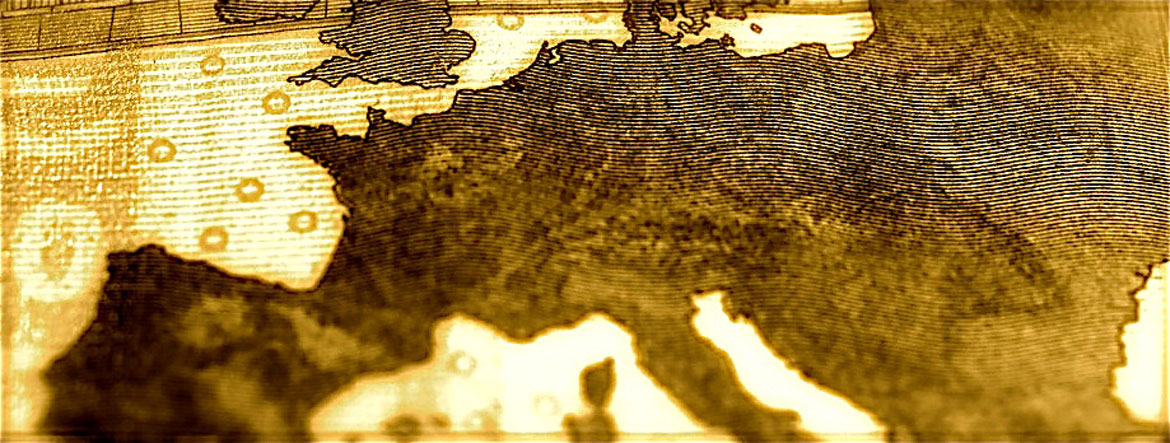 Europe on a 50 Euro bill © Jobst Oetzmann
Europe on a 50 Euro bill © Jobst Oetzmann
Baden-Baden, January 2014
The initial phase for the teleplay script “Plan B” contracted by WDR and ECO-Media, Stephan Lamby, has been successfully terminated.
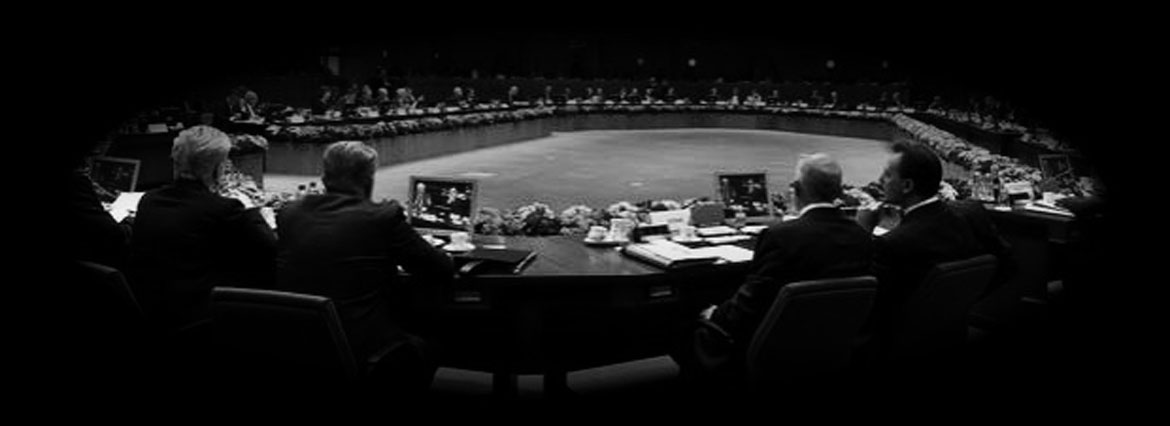 Meeting of the Council of Europe © ZDF / Processing Jobst Oetzmann
Meeting of the Council of Europe © ZDF / Processing Jobst Oetzmann
Baden-Baden, January 2014
Ongoing efforts for the teleplay script “Plan B” contracted by WDR and ECO-Media, Stephan Lamby.
 DNA sequences © Wikimedia
DNA sequences © Wikimedia
Baden-Baden, Fall 2014
Working on the screenplay “Das Blaue Leuchten“ („The Blue Light“)
 Concept of the miniseries „Bluebox Mainhattan“
Concept of the miniseries „Bluebox Mainhattan“
Baden-Baden, Spring-Summer 2013
Drawing up a concept for the working title „Bluebox Mainhattan“, a Miniseries of 6 episodes each 45 minutes long contracted by U5 Filmproduktion, Norbert Walther.
Baden-Baden, Spring-Summer 2013
The episodes „DNA“, „Der Schlüssel“ („The Key“) and „Ausgleich“ („Compensation“) for the Miniseries „Schuld“ („Guilt“) based on Ferdinand von Schirach’s literary works keep me busy.
Baden-Baden, March 2013
The Miniseries “Verbrechen“ (“Crime“) participates in the Krimifestival Wiesbaden 2013 (Wiesbaden TV Crime Story Festival).
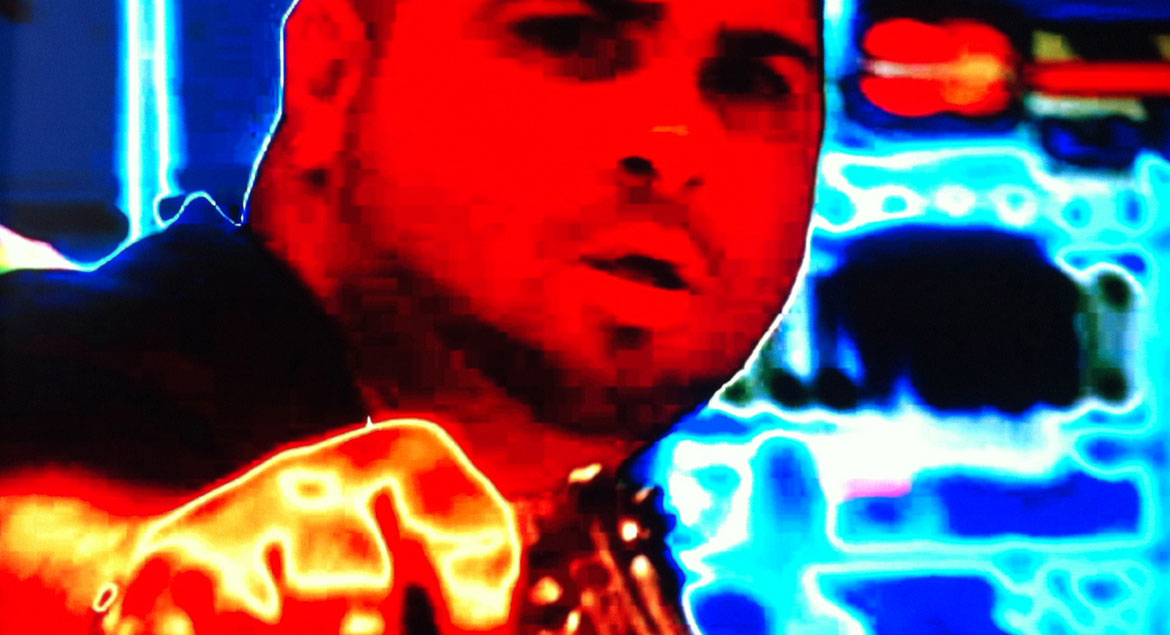 Screenshot from „Verbrechen“ © Moovie- the Art of Entertainment / ZDF
Screenshot from „Verbrechen“ © Moovie- the Art of Entertainment / ZDF
Baden-Baden, November 2012
The Miniseries “Verbrechen“ (“Crime“) makes an appearance at the “Tagen des Fernsehspiels” in Baden-Baden 2012 (Baden Baden TV Film Festival).
Berlin, Munich May, June 2012
Completion of the Miniseries “Verbrechen“ (“Crime”)
The TV series premieres at the Munich Filmfest 2012.
Berlin, January 2012
The Tatort episode „Der traurige König“ (The Scene of the Crime episode “The Sad King”) produced by Bayerischer Rundfunk (Bavarian Broadcasting) is broadcasted.
 Foto/Montage from „Verbrechen -Tanatas Teeschale“ from Reiner Bajo für © Moovie- the Art of Entertainment / ZDF
Foto/Montage from „Verbrechen -Tanatas Teeschale“ from Reiner Bajo für © Moovie- the Art of Entertainment / ZDF
Berlin, July 2011 - February 2012
Pre-production, principal photography and editing of three episodes in the Miniseries “Verbrechen” (“Crime”) based on the bestselling book of the same name by Ferdinand von Schirach, namely “Notwehr” (“Self Defense”), “Tanatas Teeschale“ (“Tanata”) and “Der Igel“ (“The Hedgehog”) for Moovie - The Art of Entertainment, Oliver Berben, contracted by ZDF. Sepp Bierbichler appears as the leading actor.
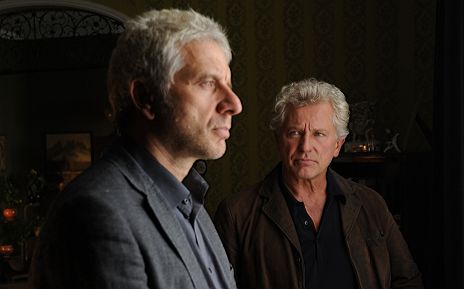 Photo booth from „Der traurige König“ BR-Tatort Udo Wachtveitl and Miroslav Nemec © 2011 BR
Photo booth from „Der traurige König“ BR-Tatort Udo Wachtveitl and Miroslav Nemec © 2011 BR
Baden-Baden, May 2011
Screenplay for „Der traurige König“ (“The Sad King”) finished with Magnus Vattrodt as cowriter for the Tatort series (The Scene of the Crime) by Bayerischer Rundfunk (Bavarian Broadcasting). Thomas Stiller will be the director.
Baden-Baden, January - May 2011
Based on the bestselling book “Verbrechen” by Ferdinand von Schirach, screenplays for three episodes of the Miniseries “Verbrechen” (“Crime”) are adapted for Moovie - The Art of Entertainment, Oliver Berben, contracted by ZDF.
Munich, June 2010
Working on screenplay “Mittsommer” (“Midsummer”) for Filmpool, Cologne. “Mittsommer” depicts the story of an old conductor, Wilhelm, who is forced to face his troubled childhood as a “tyskerbarn” (German child) in post-war Denmark – with financial support from Filmstiftung NRW (North-Rhine Westphalia Film Foundation).
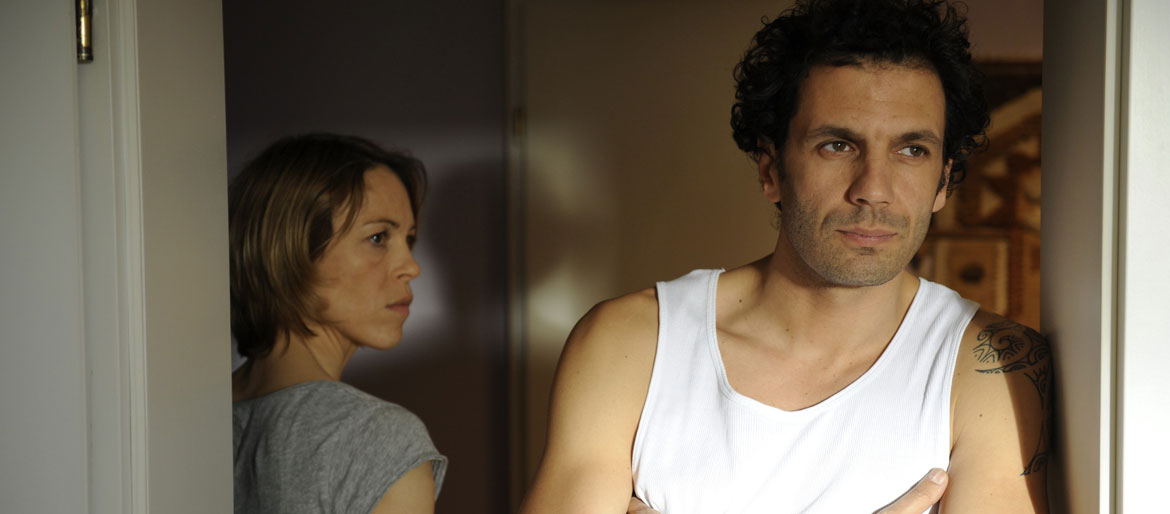 Photo booth from „Die Heilige“ BR-Tatort Anne Kim Sarnau and Medhi Nebbou © 2010 BR
Photo booth from „Die Heilige“ BR-Tatort Anne Kim Sarnau and Medhi Nebbou © 2010 BR
Munich, March/April 2010
Shooting Tatort “Die Heilige” (Scene of the Crime episode “The Saint”) for Bayerischer Rundfunk (Bavarian Broadcasting) starring Udo Wachtveitl and Miroslav Nemec, Anne Kim Sarnau, Medhi Nebbhou, and others.
The episode is largely filmed on location inside the Stadelheim prison. An entire prison ward is made available to the film crew and strict security regulations apply.
Hanno Lentz is in charge of photography.
Silvia Koller is the editor.
The episode is produced by Moovie- the Art of Entertainment, Oliver Berben contracted by Bayerischer Rundfunk (Bavarian Broadcasting).
Munich, January 2010
Screenplay for Tatort “Die Heilige” (Scene of the Crime – „The Saint“) contracted by Bayerischer Rundfunk (Bavarian Broadcasting) with Magnus Vattrodt based on a draft by Friedrich Ani.
-filtered.jpg) Photo booth from „Wir sind die Guten“ (“The Good Guys”)) BR-Tatort Miroslav Nemec © 2009 BR
Photo booth from „Wir sind die Guten“ (“The Good Guys”)) BR-Tatort Miroslav Nemec © 2009 BR
Munich, December 2009
Dec 13, 2009: Tatort episode “Wir sind die Guten” (Scene of the Crime: “The Good Guys”) is broadcast.
The German news magazine FOCUS publishes an article on this episode titled “Ein Tatort völlig von der Rolle” (“A Tatort completely crazy”).
Munich, May 2009
Shooting for “Wir sind die Guten” (“The Good Guys”) is over.
This episode to Tatort (Scene of the Crime) is produced by Bavaria and contracted by Bayerischer Rundfunk (Bavarian Broadcasting). Silvia Koller is the editor in charge.
February 2009
“Zweier Ohne” (“Coxless Pair”) participates in the Gothenburg Film Festival
November 2008
“Zweier Ohne” (“Coxless Pair“) participates in the Biberach Film Festival
Freiburg, September 2008
“Zweier Ohne” (“Coxless Pair”) participates in the Freiburg Film Festival
 Mate to „Zweier ohne“- The bridge at night © 2007 Lichtblick-Film/WDR
Mate to „Zweier ohne“- The bridge at night © 2007 Lichtblick-Film/WDR
Cologne, June 2008
“Zweier Ohne” (“Coxless Pair”), the motion picture based on the novel Dirk Kurbjuweit, has been completed.
It is expected to premiere in theaters in the fall of 2008.
January 2008
Burghart Klaussner is nominated for a “Goldene Kamera” (“Golden Camera”) award for his film “Novembermann”(“The Man in November”).
Baden-Baden, November 2007
“Novembermann” (“The Man in November”) participates in the Baden-Baden “Tage des Fernsehspiels” (Baden-Baden TV Film Festival).
Mannheim, October 2007
“Novembermann” (“The Man in November”) is awarded the “Filmkunstpreis für Fernsehen in Deutschland“ (Award for Cinematographic Artwork in German Television) at the Mannheim Film Festival 2007.
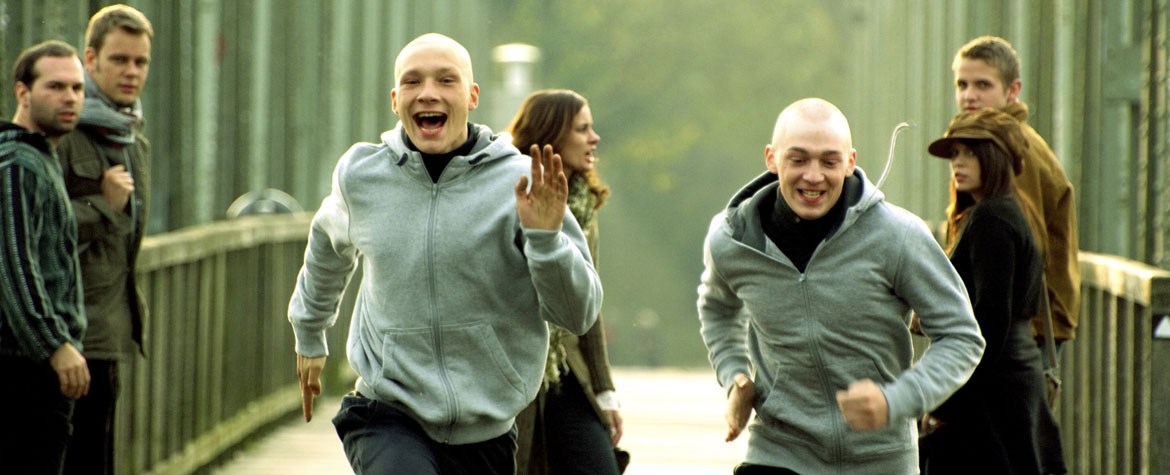 Photo booth from „Zweier ohne“ Jakob Matschens and Tino Mewes © 2007 Lichtblick-Film/WDR
Photo booth from „Zweier ohne“ Jakob Matschens and Tino Mewes © 2007 Lichtblick-Film/WDR
Cologne June/July 2007
Jobst Oetzmann starts the pre-production work on his motion picture “Zweier Ohne” (“Coxless Pair”) based on the novel by Dirk Kurbjuweit. The motion picture is produced by Lichtblick-Film, Cologne, Joachim Orthmann. Among the cast are Tino Mewes, Jakob Matschenz and Sophie Rogall.
Rome, July 2007
“Der Novembermann” („The Man in November“) is invited to participate in Rome in October 2007.
Munich, June 2007
“Der Novembermann” (“The Man in November”) premieres at the Munich Film Festival.
Berlin, Cologne, March/April 2007.
Jobst Christian Oetzmann stages two episodes of “Der Kriminalist” (“The Criminalist”) starring Christian Berkel. Volker Tittel is in charge of photography.
.jpg) Photo booth from „Der Novembermann“ with Götz George and Burghard Klaussner © 2006 Filmpool/WDR
Photo booth from „Der Novembermann“ with Götz George and Burghard Klaussner © 2006 Filmpool/WDR
Sylt, Cologne, September 2006.
Jobst Christian Oetzmann stages “Der Novembermann“ (“The Man in November”) for WDR (West German Broadcasting), a teleplay based on a script by Magnus Vattrodt. Michael Andre is the editor in charge. The teleplay is produced by filmpool, Cologne. Producers are Iris Kiefer and Julia Röskau. Götz George, Burghart Klaußner and Barbara Auer are the leading actors. Volker Tittlel is in charge of photography.
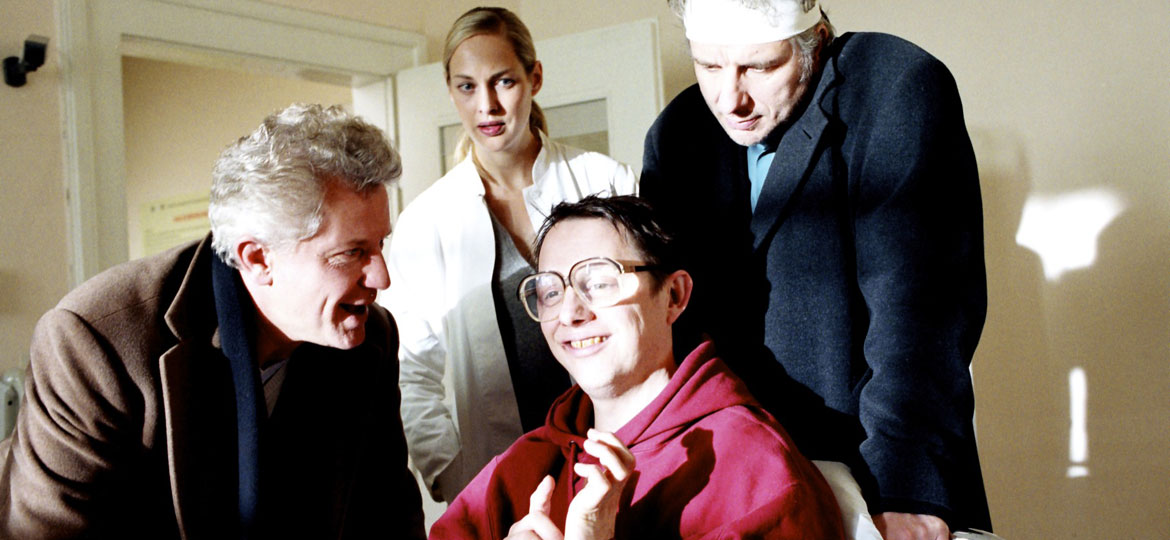 Photo booth from „Das verlorene Kind“ (“The Lost Child”) BR-Tatort Miroslav Nemec, Sophie von Kessel, Arndt Schwering- Sohnrey Udo Wachtveitl und © 2006 BR
Photo booth from „Das verlorene Kind“ (“The Lost Child”) BR-Tatort Miroslav Nemec, Sophie von Kessel, Arndt Schwering- Sohnrey Udo Wachtveitl und © 2006 BR
Munich, March 2006
Jobst Christian Oetzmann stages “Das verlorene Kind“ (“The Lost Child”) for Bayerischer Rundfunk (Bavarian Broadcasting), an episode of the Scene of the Crime series, edited by Silvia Koller, and produced by Bavaria – Veith v. Fürstenberg. Magnus Vattrodt and Jobst C. Oetzmann wrote the script. Starring Miroslav Nemec, Udo Wachtveitl, Michael Fitz, Arndt Schwering-Sohnrey, Lena Stolze, Max Herbrechter, Sophie v.Kessel.
May 2005
Jobst Oetzmann and Magnus Vattrodt coauthor „Das verlorene Kind“ (“The Lost Child”) for the editors at Bayerischer Rundfunk (Bavarian Broadcasting), Silvia Koller. Shooting will begin in March 2006.
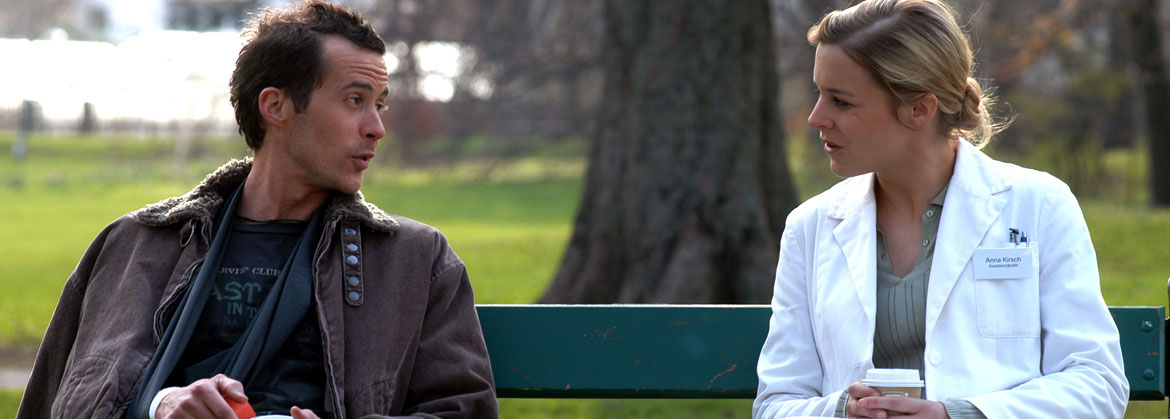 Photo booth from „Die Hochzeit meines Vaters“ (“My Father’s Wedding”) Barnaby Metschurat and Bernadette Heerwagen © 2005 ZDF/Colonia Media
Photo booth from „Die Hochzeit meines Vaters“ (“My Father’s Wedding”) Barnaby Metschurat and Bernadette Heerwagen © 2005 ZDF/Colonia Media
March 2005
Shooting for “Die Hochzeit meines Vaters“ (“My Father’s Wedding”), a film for ZDF (one of Germany’s public TV stations), begin in Munich. Bernadette Heerwagen, Michael Mendl, Barnaby Metschurat, Anna Loos, and Bruno Eyron all appear on screen.
February 2005
Jobst Oetzmann is elected to become a member of the board of Bundesverband Regie (German Directors Guild).
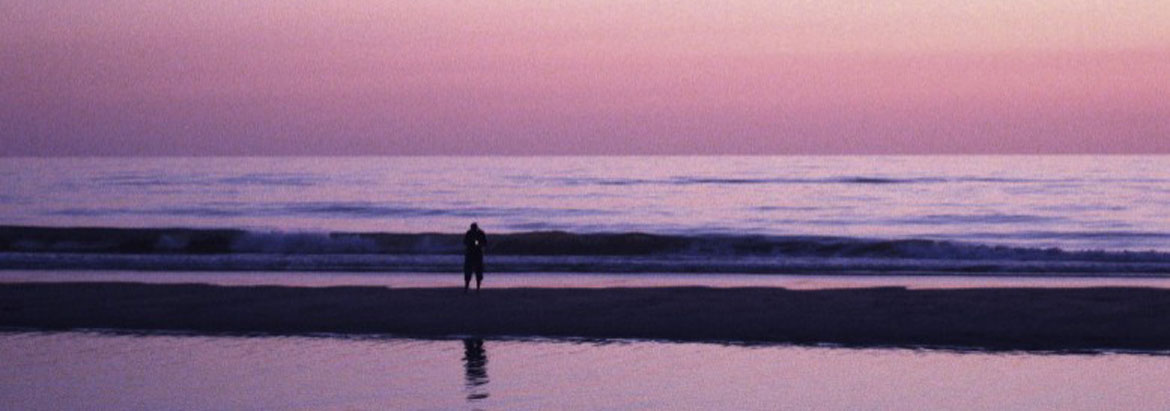 Photo booth from „Der Novembermann“ with Götz George and Burghard Klaussner © 2006 Filmpool/WDR
Photo booth from „Der Novembermann“ with Götz George and Burghard Klaussner © 2006 Filmpool/WDR
January/February 2005
Jobst Oetzmann stages his second audio play “Der Novembermann“ (“The Man in November”) based on a script by Magnus Vattrodt. The talents are Hans-Michael Rehberg, Micheal Mendl, Sophie Rogall and Lena Stolze.
Banff, April 2005
The motion picture “Delphinsommer“ (“Summer of Dolphins”) is accepted to participate in the renowned Banff Mountain Film and Book Festival, Canada.
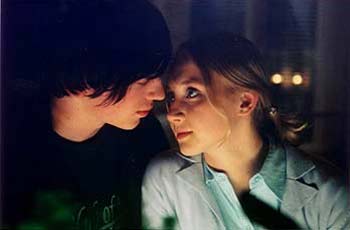 Photo booth from „Der Delphinsommer“ with Tino Mewes and Anna-Maria Mühe © 2004 Ufa/WDR
Photo booth from „Der Delphinsommer“ with Tino Mewes and Anna-Maria Mühe © 2004 Ufa/WDR
Hof, October-November 2004
A 35mm-copy of „Delphinsommer“ („Summer of Dolphins“) is shown during the Hof Filmfest.
Summer 2004
In Berlin, Jobst Oetzmann shoots the motion picture “Delphinsommer“ (“Summer of Dolphins”) for UFA-Fernsehproduktion (UFA TV Productions) and WDR, Cologne (West German Broadcasting). Among the cast are Anna-Maria Mühe, Sophie Rogall,
Tino Mewes, Samuel Finzi and Lena Stolze.
December 2004
Based on a draft by Ben Taylor, the script for “My Father’s Wedding” is written by Andrea Otte and Jobst Oetzmann for Colonia Media and contracted by ZDF (one of Germany’s public TV stations).
February 2004
“Seide” (“Silk”), the audio play based on the novel by Alessandro Baricco, is published by DAV-Verlag.
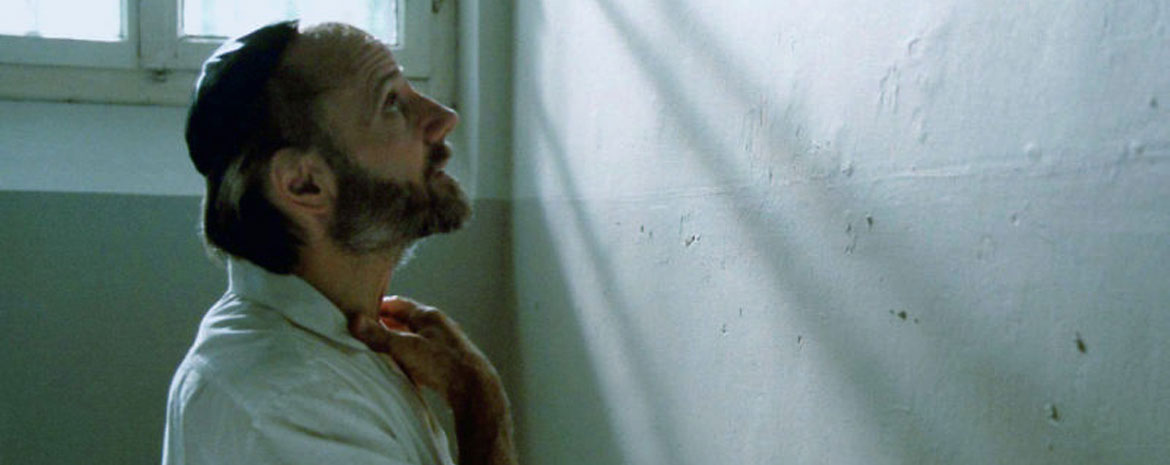 Photo booth from „Der Schächter“ (“The Butcher”) SWR-Tatort Nikolaus Paryla © 2002 SWR
Photo booth from „Der Schächter“ (“The Butcher”) SWR-Tatort Nikolaus Paryla © 2002 SWR
December 13,2003
Müncher Abendzeitung (Munich Evening News) awards Jobst Oetzmann the “Stern der Woche” (“Star of the Week”) for his Tatort episode “Der Schächter” (Scene of the Crime episode “The Butcher”).
December 2003
The Tatort episode “Der Schächter” (Scene of the Crimpe episode “The Butcher”) is broadcast on Dec 7, 2003.
September 2003
“Seide” (“Silk”) is broadcast on Sept 14, 2003. The audioplay ist based on the novel of the same name by Alessandro Baricco.
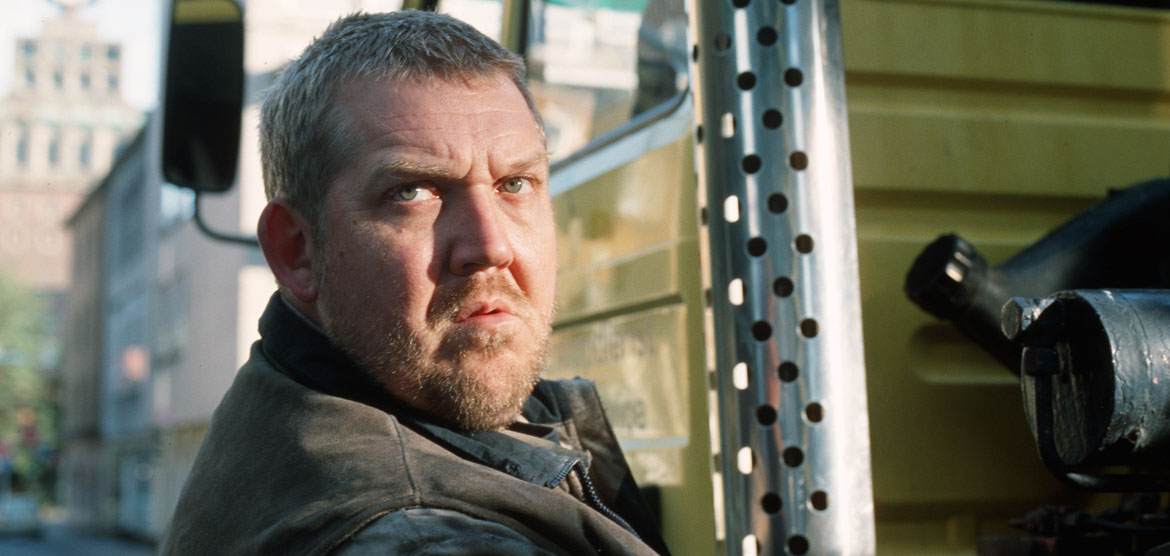 Photo booth from „Drechslers zweite Chance“ Dietmar Bär on his tow truck © 2003 WDR/Colonia Media
Photo booth from „Drechslers zweite Chance“ Dietmar Bär on his tow truck © 2003 WDR/Colonia Media
Cologne, Fall 2003
Jobst Oetzmann stages the teleplay “Drechslers zweite Chance“ (“Drechsler – A Second Chance”) starring Dietmar Bär, Joachim Krol, Sophie Lasse-Kahlke, Justin Doree, Stefan Kampwirth, Birge Schade, Rudolf Kowalski.
Music by Dieter Schleip.
Produced by Christian Granderath for Colonia Media contracted by WDR (West German Broadcasting).
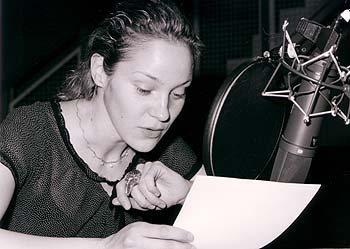 Jeanette Hain in the voice recordings for „Seide“ („silk“), radioplay after Alessandro Barrico © 2003 SWR
Jeanette Hain in the voice recordings for „Seide“ („silk“), radioplay after Alessandro Barrico © 2003 SWR
Baden-Baden, March 2003
Jobst Oetzmann stages the audio play “Seide” (“Silk”) based on the novel of the same name by Alessandro Baricco.
With the talents of Jeanette Hain, Martin Feifel and Nikolaus Paryla, the audio play “Seide” (“Silk”) was recorded in SWR studios (South-West German Broadcasting) and based on the novel by Alessandro Barrico. Dieter Schleip composed the sumptuous music.
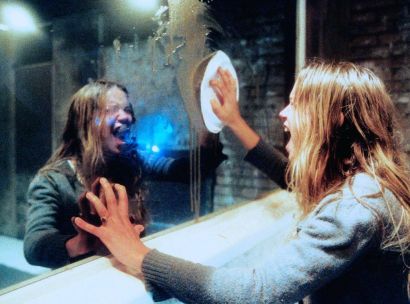 Photo booth from „1000-Tode“ SWR-Tatort Alexandra Schalaudek © 2002 SWR
Photo booth from „1000-Tode“ SWR-Tatort Alexandra Schalaudek © 2002 SWR
Tatort episode “1000-Tode” (Scene of the Crime episode “1000 Deaths”) is awarded Deutscher Kamerapreis 2003 (German Camera Award 2003), Cologne
Director of photography Jürgen Carle is awarded the “Deutscher Kamerapreis“ 2003 (German Camera Award 2003).
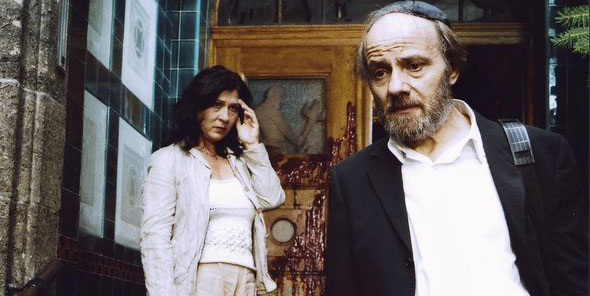 Photo booth from „Der Schächter“ SWR-Tatort Eva Mattes and Nikolaus Paryla © 2002 SWR
Photo booth from „Der Schächter“ SWR-Tatort Eva Mattes and Nikolaus Paryla © 2002 SWR
June/July 2002 shooting Tatort episode “Der Schächter” (Scene of the Crime episode “The Butcher“)
Starring Eva Mattes and Nikolaus Paryla. Tatort (Scene of the Crime) produced for SWR (South-West German Broadcasting). Shootings located at Lake Constance and in Baden-Baden for Maranfilm in collaboration with SWR.
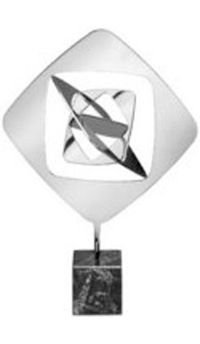 Grimme-Preis 2008
Grimme-Preis 2008![]()
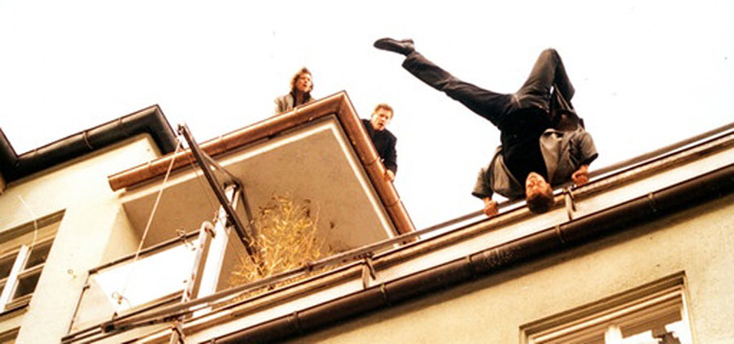 Photo booth from „Im freien Fall“ BR-Tatort Michael Fitz, Miroslav Nemec and Udo Wachtveitl © 2001 BR
Photo booth from „Im freien Fall“ BR-Tatort Michael Fitz, Miroslav Nemec and Udo Wachtveitl © 2001 BR
Marl March 22, 2002
“Im freien Fall” (“Falling Down”) wins the Grimme Award. Jobst Oetzmann won the award together with writer Alexander Adolph, editor Silvia Koller and the two actors Udo Wachtveitl and Miroslav Nemec for their work on Tatort episode “Im freien Fall”(Scene of the Crime episode “Falling Down”).
Dieter Schleip is awarded the “Preis der deutschen Filmkritik” (German Film Critics Award) for his soundtrack in “Die Einsamkeit der Krokodile” (“Solitude of the Crocodiles”).
On Jan 22, 2002 Dieter Schleip was presented with the award for his soundtrack in “Die Einsamkeit der Krokodile” (“Solitude of the Crocodiles”) at the Saarbrücken Max Ophüls Film Festival. In 1999, Dieter Schleip was nominated for his soundtrack in “Schwarzer Advent” (“Black Christmas”) for the Deutscher Fernsehpreis (German TV Award).
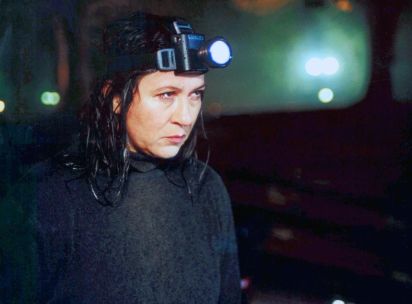 Photo booth from „1000-Tode“ SWR-Tatort Eva Mattes © 2001 SWR
Photo booth from „1000-Tode“ SWR-Tatort Eva Mattes © 2001 SWR
Baden-Baden, November 2001.
Shooting SWR-Tatort “1000-Tode”(Scene of the Crime episode “1000 Deaths” for South-West German Broadcasting) starring Eva Mattes. Eva Mattes stars as the new detective for SWR-Tatort (Scene of the Crime by South-West German Broadcasting). The shooting locations were Lake Constance and Baden-Baden. A young girl went missing. The initial suspicion: Suicide. Her desperate parents are completely lost. But detective Klara Blum cannot let go of this case. She investigates into even the tiniest of leads and in the end her suspicions are confirmed: The girl is alive, but a man without conscience holds her hostage because, initially, the two agreed online to committing suicide together.
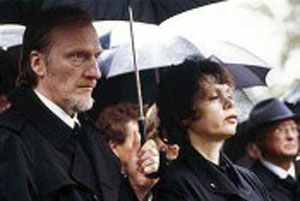 Photo booth from „Die Einsamkeit der Krokodile“ Ernst Stötzner and Renate Krößner © 1999 Olga-Film
Photo booth from „Die Einsamkeit der Krokodile“ Ernst Stötzner and Renate Krößner © 1999 Olga-Film
Strasburg, November 2001
In November 2001, “Die Einsamkeit der Krokodile” (“Solitude of the Crocodiles”) participates in the Strasburg “Forum du Cinema” as a German contester.
New York, November 2001
The Guggenheim’s series “German Cinema” shows “Die Einsamkeit der Krokodile” (“Solitude of the Crocodiles”) in New York.
October 2001
The art director Annette Ganders and “Schwindelnde Höhe” (“Dizzying Height”) are nominated for the Deutscher Fernsehpreis 2001 (German Television Award 2001) in the category Best Set.
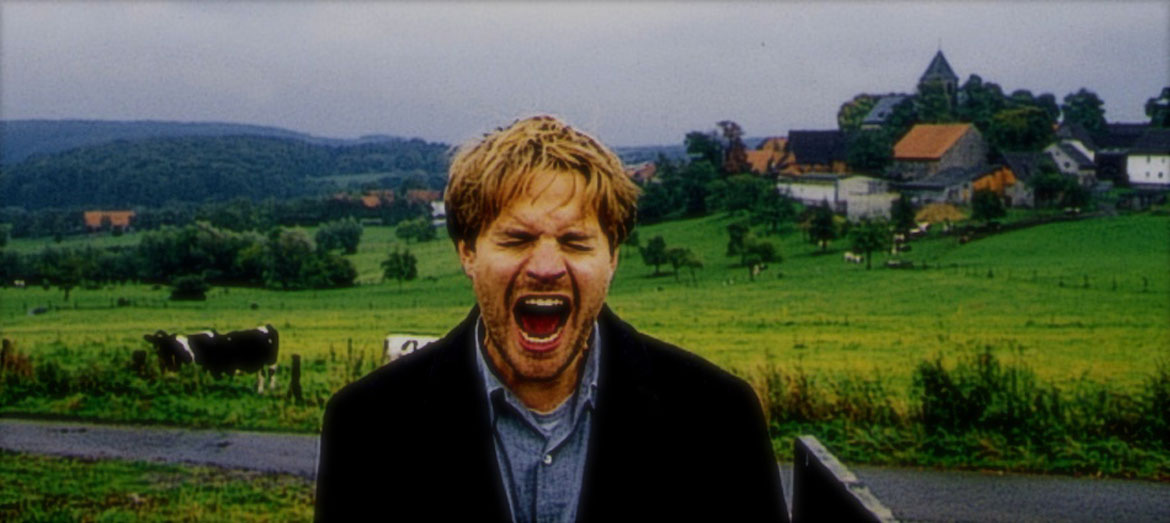 Photo booth from „Die Einsamkeit der Krokodile“ Janek Rieke, © 1999 Olga-Film
Photo booth from „Die Einsamkeit der Krokodile“ Janek Rieke, © 1999 Olga-Film
Munich, June 2001
“Schwindelnde Höhe” (“Dizzying Heights”) participates in the TV-movie section of the Munich Filmfest.
The TV coproduction “Schwindelnde Höhen” (“Dizzying Heights”) by SWR (South-West German Broadcasting) and arte premieres at the Munich Filmfest. The film also participates in the competition to achieve the VFF Award for Best Television Production.
Moscow 2001
“Die Einsamkeit der Krokodile” (“Solitude of the Crocodiles”) participates in a series organized by Bayerischer Filmförderung fff (Bavarian Film Promotion fff).
Cannes, June 2001
“Die Einsamkeit der Krokodile” (“Solitude of the Crocodiles”) is part of the German Series in Cannes.
Hong Kong, June 2001
“Die Einsamkeit der Krokodile” (“Solitude of the Crocodiles”) participates in the Hong Kong Film Festival.
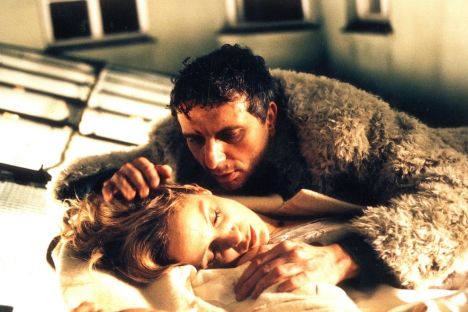 Photo booth from „Im freien Fall“ BR-Tatort Udo Wachtveitl and Jeanette Hain © 2001 BR
Photo booth from „Im freien Fall“ BR-Tatort Udo Wachtveitl and Jeanette Hain © 2001 BR
Munich, March 2001
Shooting finished for BR-Tatort episode “Im freien Fall” (Scene of the Crime episode “Falling Down” by Bavarian Broadcasting) starring Udo Wachtveitl, Miroslav Nemc, Jeanette Hain and Nikolaus Paryla.
Mill Valley California, June 2001
“Die Einsamkeit der Krokodile” (“Solitude of the Crocodiles”) participates in the Mill Valley, Ca. Film Festival.
Williamsburg Brooklyn 2001,
“Die Einsamkeit der Krokodile” (“Solitude of the Crocodiles”) won yet another award: Director of photography Hanno Lentz received a “Certificate for Outstanding Achievement” for his cinematography at the Williamsburg Brooklyn Film Festival.
Munich, January 2001
“Die Einsamkeit der Krokodile” (“Solitude of the Crocodiles”) wins the Bayerischer Filmpreis 2001 (Bavarian Film Award 2001).
The award ceremony is held on Jan 19, 2001.
“Die Einsamkeit der Krokodile” (“Solitued of the Crocodiles”) wins the top award of the evening. “Vergesst Amerika” (“Forget about America”) by Vanessa Joop and “Die Einsamkeit der Krokodile” (“Solitude of the Crocodiles) share the award with the highest prize money in German film industry. The Bavarian Minister President presents Molly v. Fürstenberg and Harald Kügler with the award for “Best Film”.
“Die Einsamkeit der Krokodile” (“Solitude of the Crocodiles”) a contestant for the Max-Ophüls-Preis 2001 (Max Ophüls Award) in Saarbrücken
It was the first time for Jobst Oetzmann to be invited to Saarbrücken and it was also his last time. For Saarbrücken is only open to a director’s first three feature films. And “Einsamkeit der Krokodile” (“Solitude of the Crocodiles”) is the third feature film by Jobst Oetzmann. Hence it was his debut and his finale with full theaters and an excited audience.
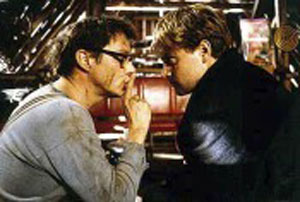 Photo booth from „Die Einsamkeit der Krokodile“ Arndt Schwering Sohnrey and Janek Rieke © 1999 Olga-Film
Photo booth from „Die Einsamkeit der Krokodile“ Arndt Schwering Sohnrey and Janek Rieke © 1999 Olga-Film
“Die Einsamkeit der Krokodile” (“Solitude of the Crocodiles”) came in 2nd for the Audience Award at the Lünen Filmfest 2000
The comedy “Jetzt oder Nie” (“Now or Never”) won. Traditionally, the audience is asked to give their opinion at Lünen Filmfest, and the award is presented based on these opinions at the end of the festival. For a picture as unconventional as “Die Einsamkeit der Krokodile”(“Solitude of the Crocodiles”) to come in 2nd for an Audience Award is in itself quite a success already.
Hof November 2000
“Die Einsamkeit der Krokodile” (“Solitude of the Crocodiles”) participates in the Hofer Filmtage 2000 (Hof Film Festival 2000).
In October 2000, the picture “Die Einsamkeit der Krokodile” (“Solitude of the Crocodiles”) premieres during the Hofer Filmtage (Hof Film Festival). Festival director Heinz Badewitz himself chose the picture among many other new German productions for this year’s festival program.
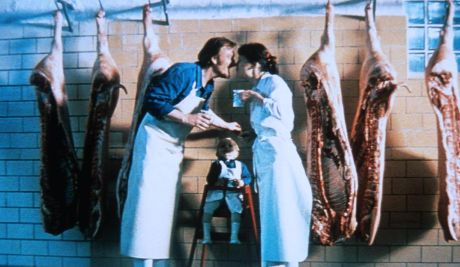 Photo booth from „Die Einsamkeit der Krokodile“ Ernst Stötzner and Renate Krößner © 1999 Olga-Film
Photo booth from „Die Einsamkeit der Krokodile“ Ernst Stötzner and Renate Krößner © 1999 Olga-Film
1999 Jobst Oetzmann shoots his first feature film for cinema “Die Einsamkeit der Krokodile” (“Solitude of the Crocodiles”). Shootings are located in eastern Westphalia and are contracted by Olga-Film. The picture’s cast includes Janek Rieke, Thomas Schmauser, Rosemarie Fendel, Julia Jäger, Ernst Stötzner, Dynelle Rhodes and many others. Hanno Lentz is the cinematographer in charge.
The picture is produced by Olga-Film, Munich. ZDF (one of Germany’s public TV stations) co-partners for this feature film production.
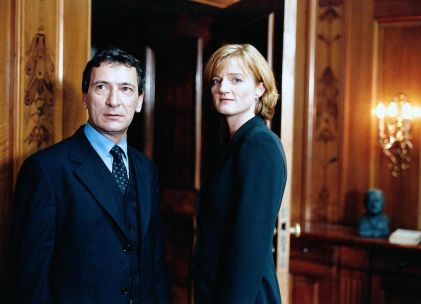 Photo booth from „Duell der Richter“ TV play of the SWR Rudolf Kowalski and Nina Petri © 1998 SWR
Photo booth from „Duell der Richter“ TV play of the SWR Rudolf Kowalski and Nina Petri © 1998 SWR
Baden-Baden, September 1998
Shooting “Duell der Richter” (“Dueling Judges”)
In 1998 Jobst Oetzmann stages a law-themed drama for SWR (South-West German Broadcasting) based on a book by Fred Breinersdorfer starring Nina Petri, Rudolf Kowalski and Christian Berkel as leading actors.
One year later, the picture is among the nominations for the Grimmepreis (Grimme Awards).
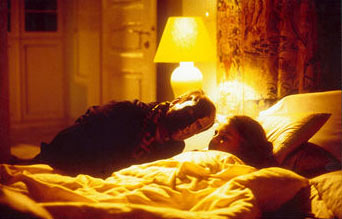 Photo booth from „Schwarzer Advent“ BR-Tatort Christian Berkel © 1997 BR
Photo booth from „Schwarzer Advent“ BR-Tatort Christian Berkel © 1997 BR
Munich, November 1997
Shooting Tatort episode “Schwarzer Advent” (Scene of the Crime episode “Black Christmas”)
In 1997, Jobst Oetzmann shoots Tatort episode “Schwarzer Advent” (Scene of the Crime episode “Black Christmas”) for Bayerischer Rundfunk (Bavarian Broadcasting) starring Miroslav Nemec, Udo Wachtveitl, Christian Berkel, Hans Michael Rehberg and Julia Richter. In 1998, the episode is on the list of nominations for Grimmepreis 1998 (Grimme Awards). The music by composer Dieter Schleip is nominated for Deutscher Fernsehpreis (German TV Awards).
In 1996 “Der Neue” (“The New Guy”) is created as the pilot for the new detective series “Kommissare Südwest” (“Detectives South-West”) on behalf of SWR (South-West German Broadcasting). Jobst Oetzmann will contribute three additional episodes.
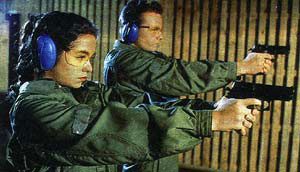 Photo booth from „SK-Babies“ Serien Pilto for RTL Türkiz Talay and Michael Deffert © 1992 RTL
Photo booth from „SK-Babies“ Serien Pilto for RTL Türkiz Talay and Michael Deffert © 1992 RTL
October 1995
Jobst Oetzmann shoots pilot episode “Countdown” for the series “SK-Babies“ on behalf of RTL (one of Germany’s private TV stations). Cinematography by Thorsten Breuer; Music by Dieter Schleip
April 1994
Jobst Oetzmann shoots four episodes of the series classic “SOKO 5113” on behalf of ZDF (one of Germany’s public TV stations).
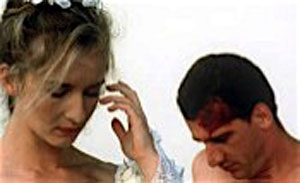 Photo booth from „Der Condor“ werner Stocker and Hans Beerhenke © 1987 Andy Kaysser for SLIM/HFF
Photo booth from „Der Condor“ werner Stocker and Hans Beerhenke © 1987 Andy Kaysser for SLIM/HFF
October 1992
“Only You” participates in the Hofer Filmtage (Hof Film Festival). “Only You“ is Jobst Oetzmann’s graduation picture upon leaving HFF Munich, Dept. III, Film and Television Plays.
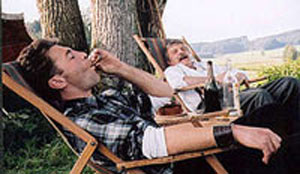 Photo booth from „Der Condor“ Werner Stocker and Hans Beerhenke © 1987 Andy Kaysser for SLIM/HFF
Photo booth from „Der Condor“ Werner Stocker and Hans Beerhenke © 1987 Andy Kaysser for SLIM/HFF
Turin 1988
Jobst Oetzmann’s first feature film “Der Condor” (“The Condor”) starring Werner Stocker and Hans Beerhenke as leading actors is the opener for the 1988 “Cinema Giovanni” in Turin.
In 1985, Jobst Oetzmann is accepted to attend the Münchner Hochschule für Fernsehen und Film (Munich University of Television and Film) in the Department for Film and TV plays. During the course of his studies, he attends seminars with Laslo Koltai, Istvan Szabo’s cinematographer, and Jiri Weiss, a director from former Czechoslovakia. Getting to know these industry personalities leaves a lasting impression on Jobst Oetzmann and his work.

